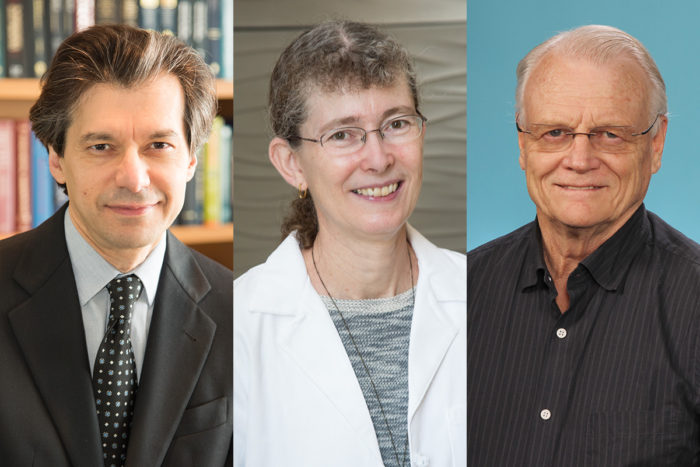AAAS names 3 faculty as 2016 fellows
School of Medicine's Bonni, Hanson, Stormo named to world’s largest scientific society
 Washington University
Washington UniversityThe American Association for the Advancement of Science has named (from left) Azad Bonni, MD, PhD, Phyllis I. Hanson, MD, PhD, and Gary Stormo, PhD, as 2016 fellows in recognition of their scientific accomplishments.
Three faculty members at Washington University School of Medicine in St. Louis are among 391 new fellows selected by the American Association for the Advancement of Science (AAAS), the world’s largest general scientific society. Azad Bonni, MD, PhD; Phyllis I. Hanson, MD, PhD; and Gary D. Stormo, PhD, will receive the highest honor awarded by AAAS in recognition of their distinguished efforts to advance science or its applications.
The three new Washington University fellows will be formally announced in the Nov. 25 issue of Science and honored Feb. 18 during the 2017 AAAS Annual Meeting in Boston.
Azad Bonni
Bonni, the Edison Professor of Neurobiology and head of the Department of Neuroscience, is being honored for seminal contributions in neuroscience, particularly for discovering how the brain is built at the level of individual connections between nerve cells, and how those mechanisms contribute to neurological diseases when they go awry.
Key areas of his research include studies of the mechanisms that regulate the development of nerve cells and their ability to connect with each other in the brain. The Bonni laboratory deploys a diverse set of tools and approaches from biochemistry, molecular biology, genetics, imaging and electrophysiology to the study of circuit assembly and function in the mouse and rat cerebellum.
Bonni earned his medical degree and completed his internship in medicine at Queen’s University in Kingston, Ontario. He then completed his residency in neurology at McGill University in Montreal. He received his doctoral degree from Harvard University.
He is director of the university’s McDonnell Center for Cellular and Molecular Neurobiology. His past honors include the Genzyme Outstanding Achievement in Biomedical Science Award, the Burroughs Wellcome Fund Award, and the Alfred P. Sloan Foundation Award. Bonni also is a Fellow of the Royal College of Physicians and Surgeons of Canada.
Phyllis I. Hanson
Hanson, the Gerty T. Cori Professor at the School of Medicine, is being recognized for her innovative contributions to defining the molecular machinery responsible for transporting proteins in membrane-bound packets to different parts of the cell or outside the cell.
A professor of cell biology and physiology, Hanson is known for her work on a family of enzymes known as AAA+ ATPases that change the shape of proteins and the membranes with which they are associated, and on the machinery that plays a vital role in bending membranes away from the cytoplasm to bud off small vesicles and viruses. Her research has led to insight into the pathogenesis of diseases that involve defects in membrane trafficking, including dystonia (a movement disorder in which muscles contract uncontrollably), neurodegenerative disease and cancer.
Hanson earned her bachelor’s degree from Yale University and medical and doctoral degrees from Stanford University. She is chair of the National Institutes of Health (NIH) Membrane Biology and Protein Processing Study Section and a member of the American Society of Cell Biology and the Hope Center for Neurological Disorders at Washington University. Among her honors, Hanson was a W.M. Keck Foundation Distinguished Young Scholar in Medical Research and also has received Searle, McKnight and Sloan scholar awards.
Gary D. Stormo
Stormo, the Joseph Erlanger Professor at the School of Medicine, was elected as an AAAS fellow for distinguished contributions to the field of computational biology. He has pioneered computational techniques now used to identify and analyze meaningful patterns in DNA sequences that indicate an important role for that section of the genome.
A professor of genetics, of biomedical engineering and of computer science, Stormo also has made significant contributions to understanding the structure and function of DNA and its close chemical cousin, RNA. In particular, his work helps explain how proteins interact directly with DNA and govern whether gene expression is dialed up or down.
Stormo has served as executive editor of the journal Bioinformatics and deputy editor-in-chief of PLOS Computational Biology. He also has published a book about protein-DNA interactions. He was the founding director of the Computational Biology Graduate Program at the School of Medicine. He is a fellow of the American College of Medical Informatics, the International Society for Computational Biology and the St. Louis Academy of Sciences.
He earned his master’s and doctoral degrees in molecular, cellular and developmental biology from the University of Colorado at Boulder and remained there for postdoctoral research before joining the faculty. He came to Washington University in 1999.






